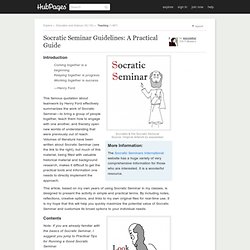

Www.nwabr.org/education/pdfs/PRIMER/PrimerPieces/SocSem.pdf. Inside the Classroom Door… » Socratic Seminar Guide. Socratic Seminar Preparation Guide A Socratic seminar is one where we examine a text for a deeper understanding of the ideas rather than “right” answers. It requires knowledge of the text and using the text to support your thoughts. Www.authenticeducation.org/documents/WhatSeminar04.pdf. Socratic Seminar Student Guidelines. "The unexamined life is not worth living. " -Socrates Guidelines for Participants in a Socratic Seminar 1. Hhh.k12.ny.us/uploaded/PDFs/DI_Pdfs/Day_1/hertberg.pdf. Socratic Seminar Guidelines: A Practical Guide. Balancing Participation: In the first discussion of any group, three to five people will monopolize the conversation right away.

This is natural but far from ideal. Ideally, the conversation is equally shared among all of the participants.